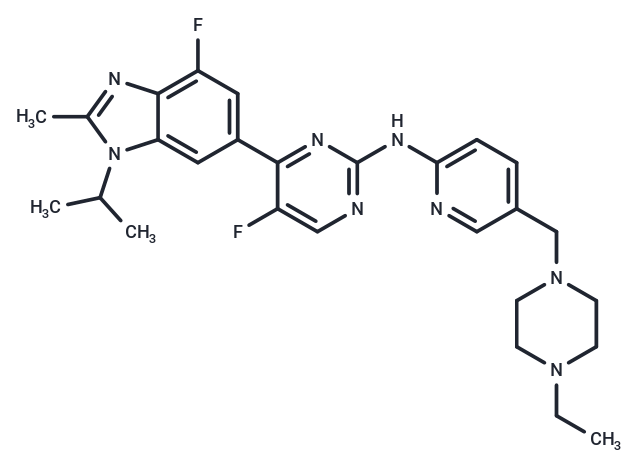Shopping Cart
- Remove All
 Your shopping cart is currently empty
Your shopping cart is currently empty

Abemaciclib (LY2835219) is a dual inhibitor of CDK4/6 (IC50=2/10 nM) with selectivity and specificity. Abemaciclib has antitumor activity and is used to treat advanced or metastatic breast cancer.

| Pack Size | Price | Availability | Quantity |
|---|---|---|---|
| 5 mg | $48 | In Stock | |
| 10 mg | $59 | In Stock | |
| 25 mg | $78 | In Stock | |
| 50 mg | $97 | In Stock | |
| 100 mg | $123 | In Stock | |
| 200 mg | $156 | In Stock | |
| 500 mg | $288 | In Stock |
| Description | Abemaciclib (LY2835219) is a dual inhibitor of CDK4/6 (IC50=2/10 nM) with selectivity and specificity. Abemaciclib has antitumor activity and is used to treat advanced or metastatic breast cancer. |
| Targets&IC50 | CDK4:2 nM, CDK6:10 nM |
| In vitro | METHODS: HNSCC cell lines OSC-19, FaDu and YD-10B were treated with Abemaciclib (0.01-10 μM) for 72 h, and cell viability was measured by Cell Counting Kit. RESULTS: Abemaciclib treatment decreased the cell viability of HNSCC cells with IC50 values ranging from 0.5 μM to 0.7 μM. [1] METHODS: AML cells MV4-11 were treated with Abemaciclib (0.04-5 μM) for 24 h. The cell cycle was detected using Flow Cytometry. RESULTS: Abemaciclib induced G1 phase block in MV4-11 cells. The G1-phase block was maximized when the concentration was ≥320 nmol/L. The RESULTS showed that Abemaciclib induced G1-phase block in MV4-11 cells. [2] |
| In vivo | METHODS: To assay antitumor activity in vivo, Abemaciclib (45-90 mg/kg in 1% HEC in 20 mM phosphate buffer (pH 2.0)) was administered by gavage to BALB/c mice bearing human tongue squamous carcinoma tumors OSC-19 once daily for fourteen days. RESULTS: Abemaciclib significantly reduced tumor growth in OSC-19 xenografts during treatment. abemaciclib treatment decreased AKT phosphorylation but had no effect on mTOR activation. [1] METHODS: To assay antitumor activity in vivo, Abemaciclib (22.5-90 mg/kg in 1% HEC in 25 mmol/L PB pH2) was administered by gavage to athymic nude mice harboring melanoma A375 once a day for twenty-one days. RESULTS: Statistically significant tumor growth inhibition was observed with Abemaciclib at 45 or 90 mg/kg dosing regimens. abemaciclib treatment significantly reduced pS780-Rb and pS10-Histone H3 levels, suggesting that CDK4/6 inhibition resulted in cell cycle inhibition and reduced tumor cell proliferation. [3] |
| Kinase Assay | Cells (5×103) are plated in 96 well plates. Cells are treated the next day for 24 to 48 hours and then assessed for caspase-3 activity by Caspase-Glo-3/7 Assay, as per manufacturer's instructions and a luminescence plate reader. |
| Cell Research | LY2835219 is dissolved in DMSO to a 10 mM concentration.? Cells are seeded in a 96-well plate, allowed to adhere overnight, and treated with DMSO control (0.1% v/v) or the indicated compounds for 72 h. Cell viability and proliferation are determined using a Cell Counting Kit according to the manufacturer's instructions. The interaction between LY2835219 and mTOR inhibitor is determined using CompuSyn. Combination index (CI) values of 1 indicates and additive drug interaction, whereas a CI of <1 is synergistic and a CI of >1 is antagonistic. |
| Alias | LY2835219, CDK4/6 dual inhibitor |
| Molecular Weight | 506.59 |
| Formula | C27H32F2N8 |
| Cas No. | 1231929-97-7 |
| Smiles | C(C)(C)N1C=2C(=C(F)C=C(C2)C3=NC(NC4=CC=C(CN5CCN(CC)CC5)C=N4)=NC=C3F)N=C1C |
| Relative Density. | 1.32 g/cm3 (Predicted) |
| Storage | Powder: -20°C for 3 years | In solvent: -80°C for 1 year | Shipping with blue ice. |
| Solubility Information | DMSO: < 1 mg/ml, Sonication is recommended. Ethanol: 1.69 mg/mL (3.34 mM), Sonication is recommended. 10% DMSO+90% Saline: 0.1 mg/mL (0.2 mM), In vivo: Please add co-solvents sequentially, clarifying the solution as much as possible before adding the next one. Dissolve by heating and/or sonication if necessary. Working solution is recommended to be prepared and used immediately. |

Copyright © 2015-2025 TargetMol Chemicals Inc. All Rights Reserved.